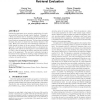Free Online Productivity Tools
i2Speak
i2Symbol
i2OCR
iTex2Img
iWeb2Print
iWeb2Shot
i2Type
iPdf2Split
iPdf2Merge
i2Bopomofo
i2Arabic
i2Style
i2Image
i2PDF
iLatex2Rtf
Sci2ools
119
click to vote
SIGIR
2010
ACM
2010
ACM
Learning more powerful test statistics for click-based retrieval evaluation
Interleaving experiments are an attractive methodology for evaluating retrieval functions through implicit feedback. Designed as a blind and unbiased test for eliciting a preference between two retrieval functions, an interleaved ranking of the results of two retrieval functions is presented to the users. It is then observed whether the users click more on results from one retrieval function or the other. While it was shown that such interleaving experiments reliably identify the better of the two retrieval functions, the naive approach of counting all clicks equally leads to a suboptimal test. We present new methods for learning how to score different types of clicks so that the resulting test statistic optimizes the statistical power of the experiment. This can lead to substantial savings in the amount of data required for reaching a target confidence level. Our methods are evaluated on an operational search engine over a collection of scientific articles. Categories and Subject D...
Related Content
| Added | 16 Aug 2010 |
| Updated | 16 Aug 2010 |
| Type | Conference |
| Year | 2010 |
| Where | SIGIR |
| Authors | Yisong Yue, Yue Gao, Olivier Chapelle, Ya Zhang, Thorsten Joachims |
Comments (0)

